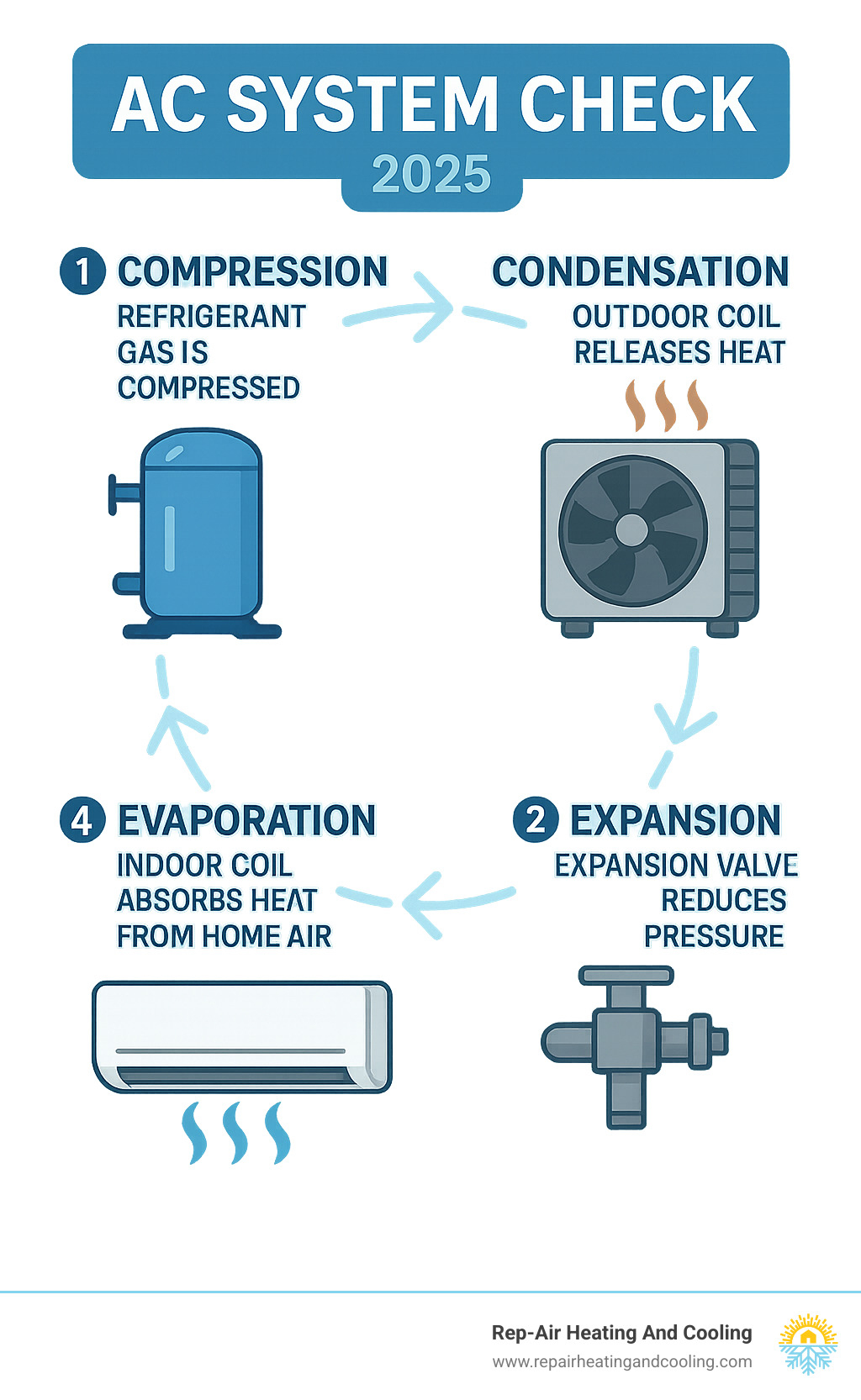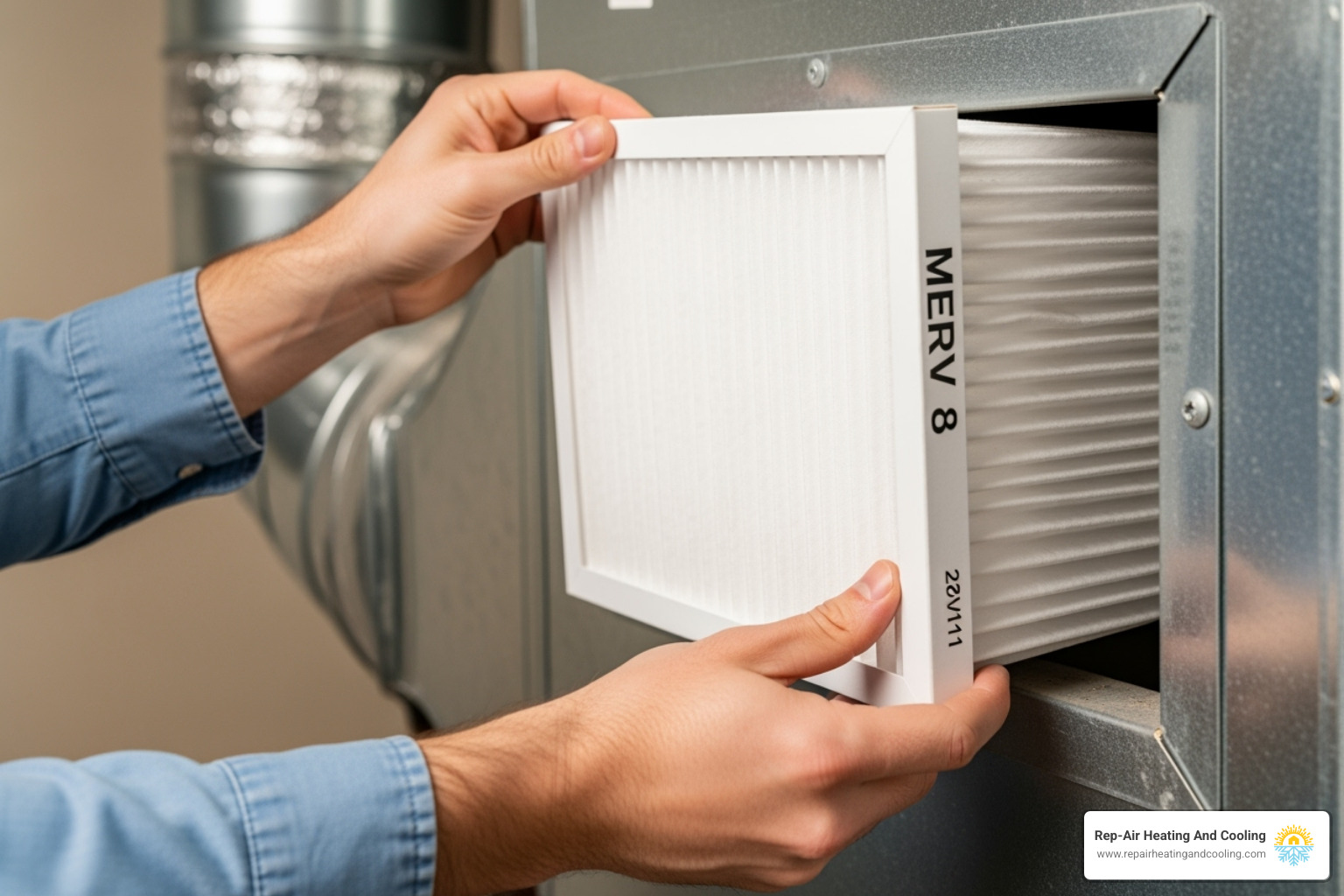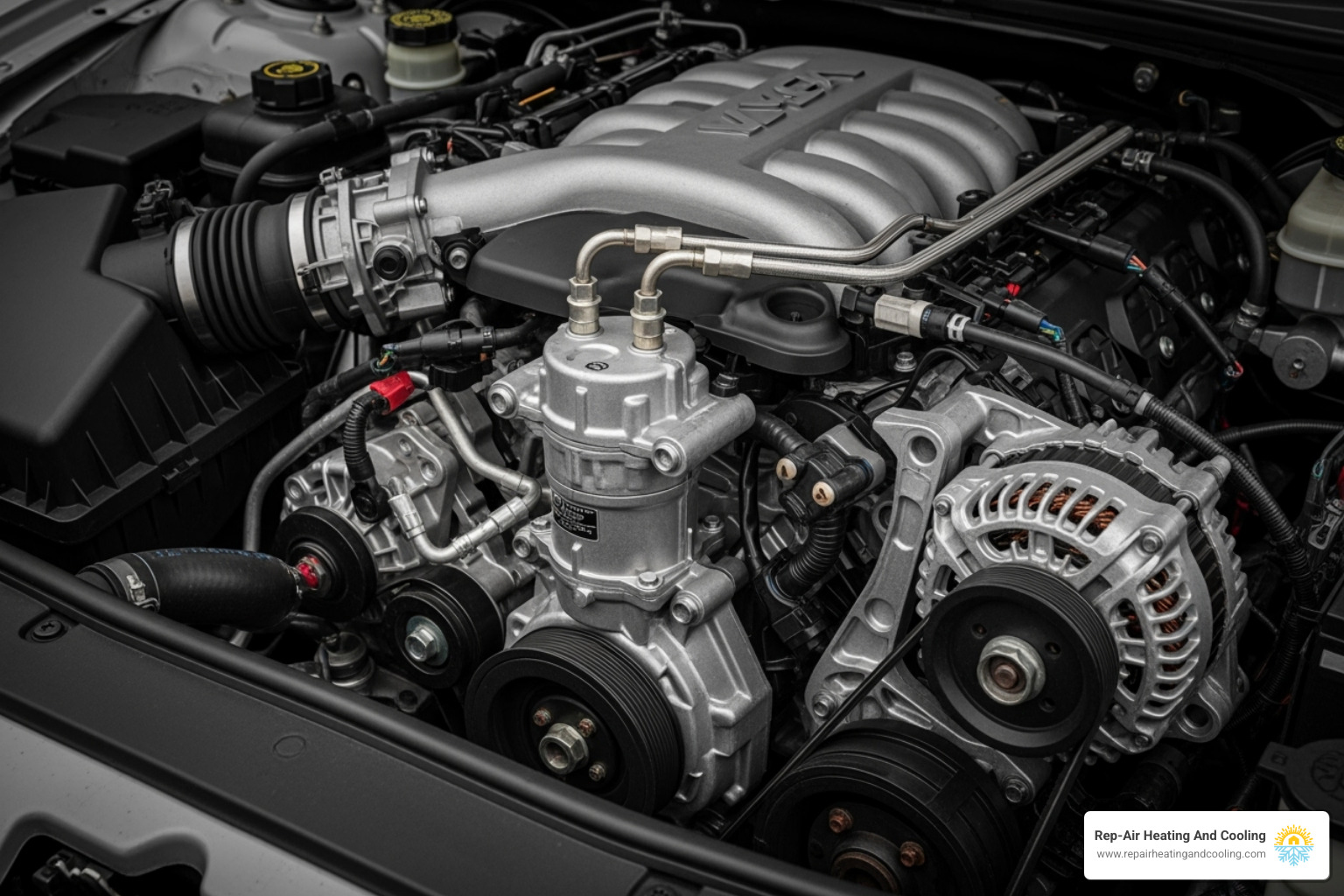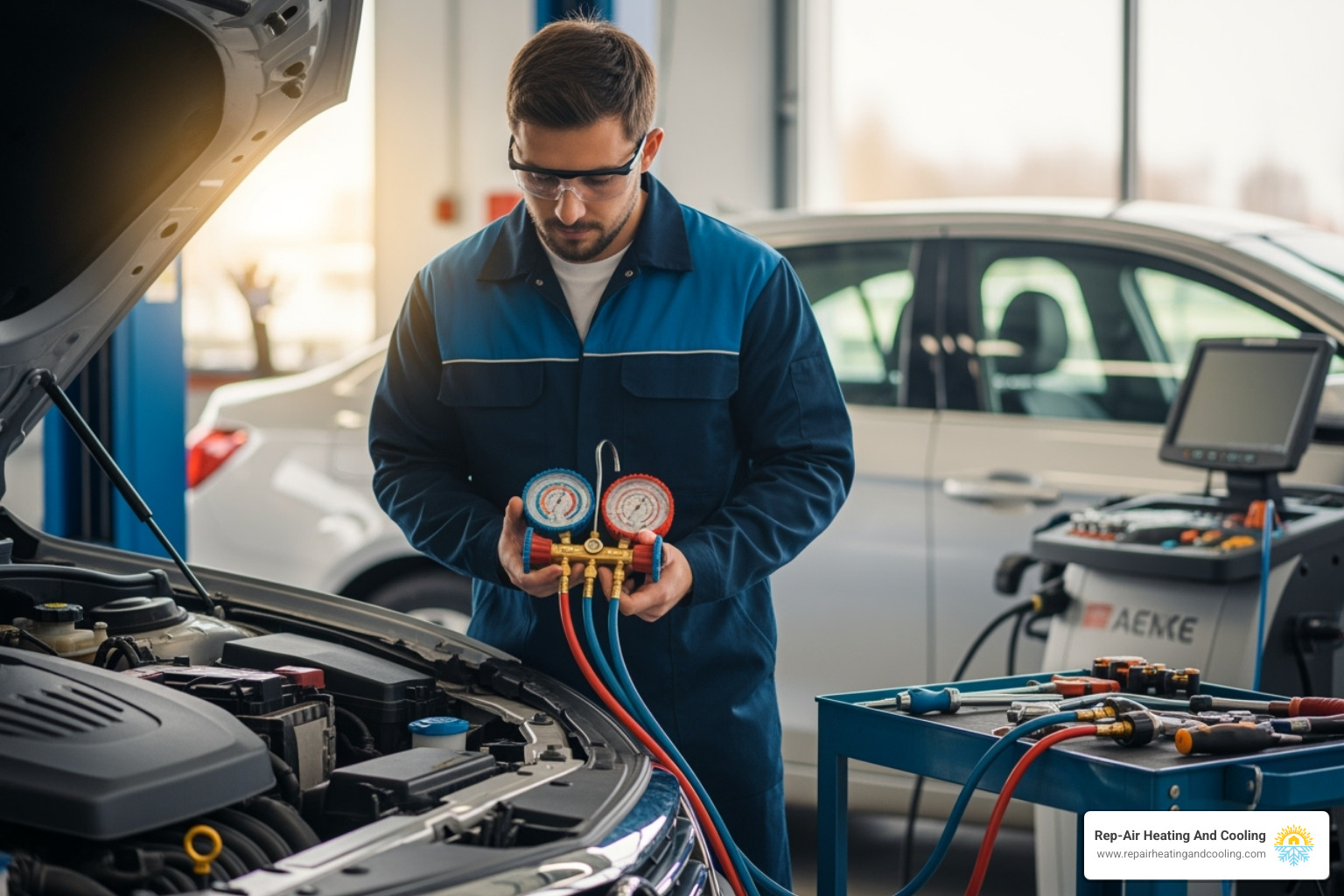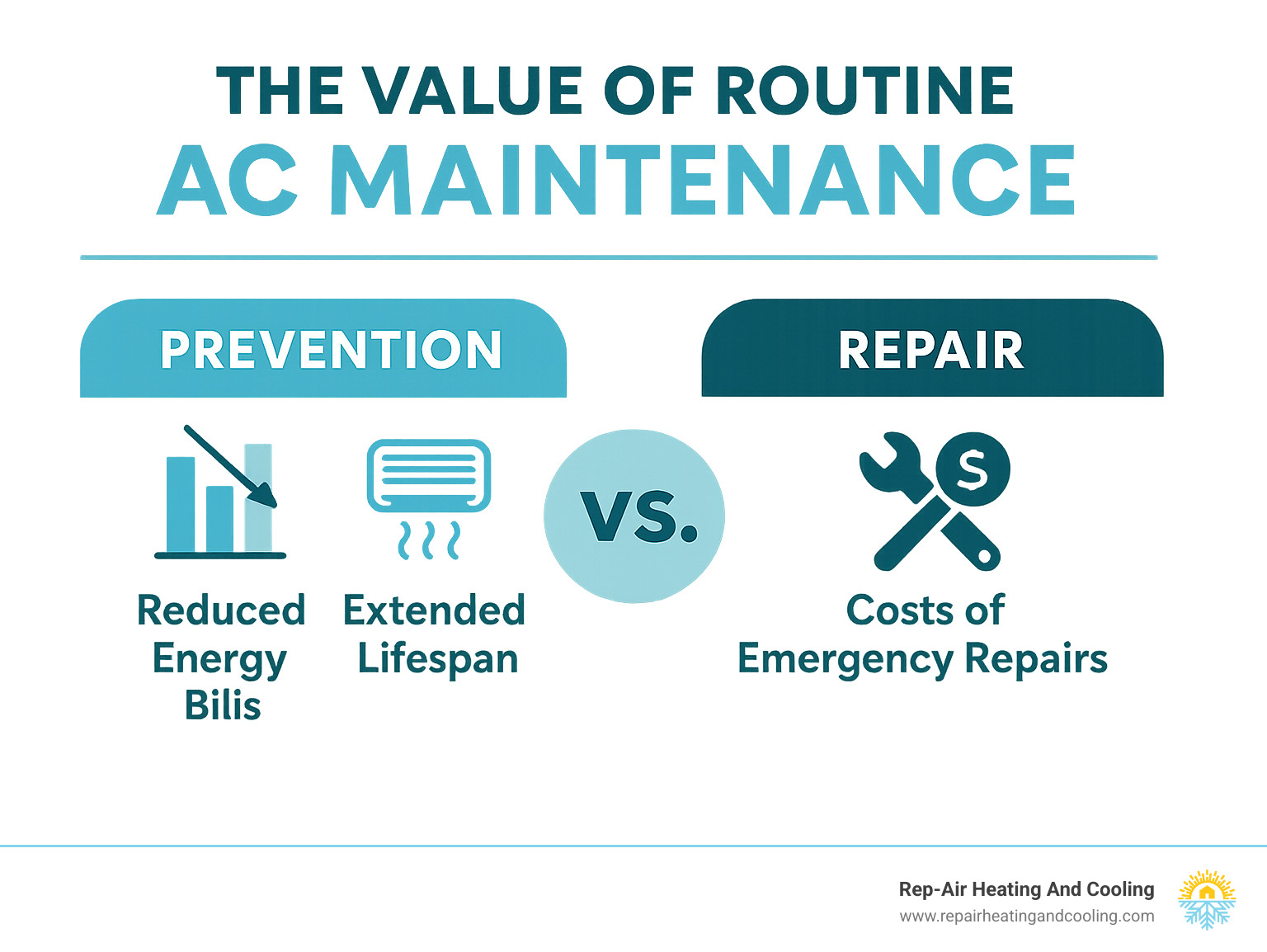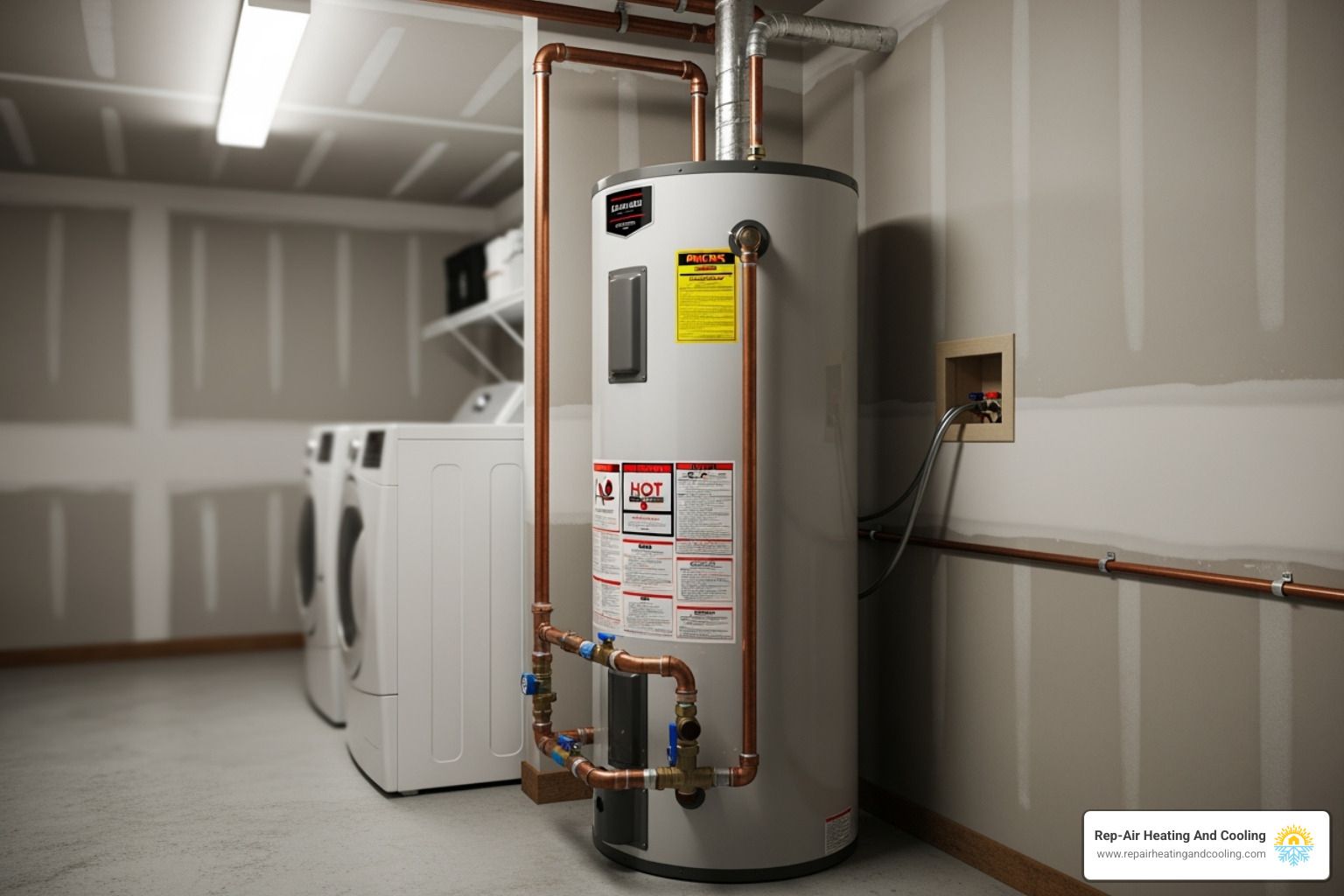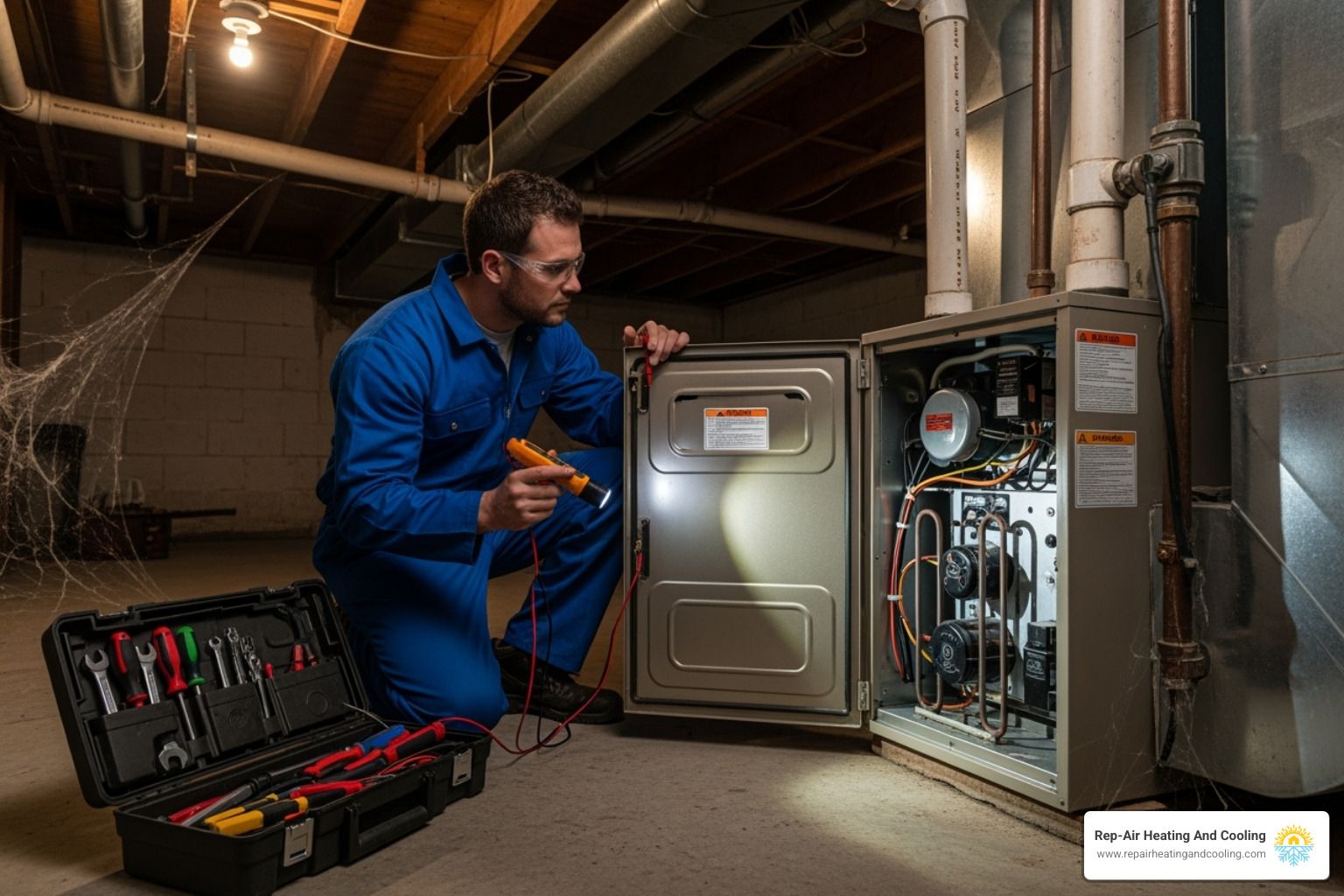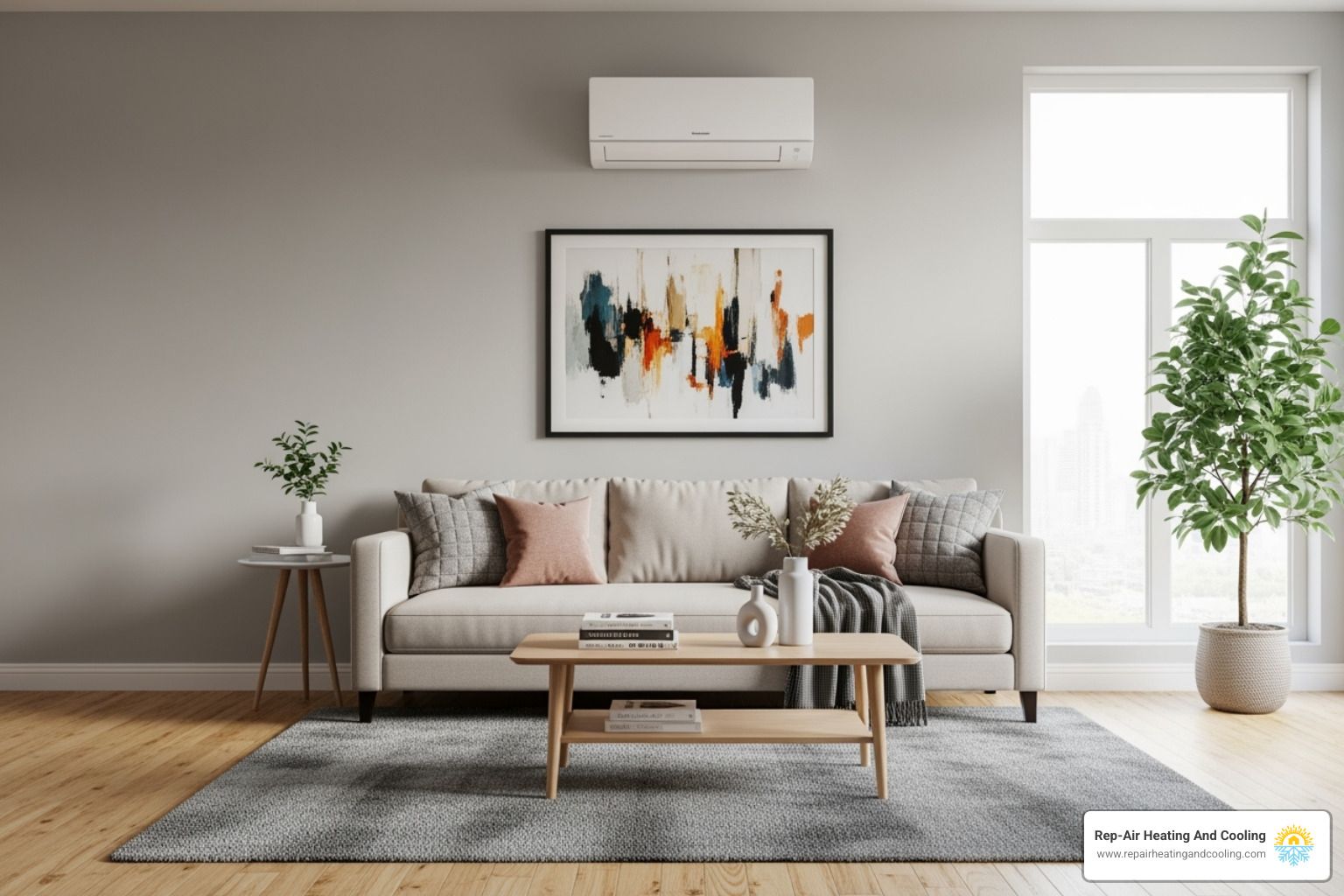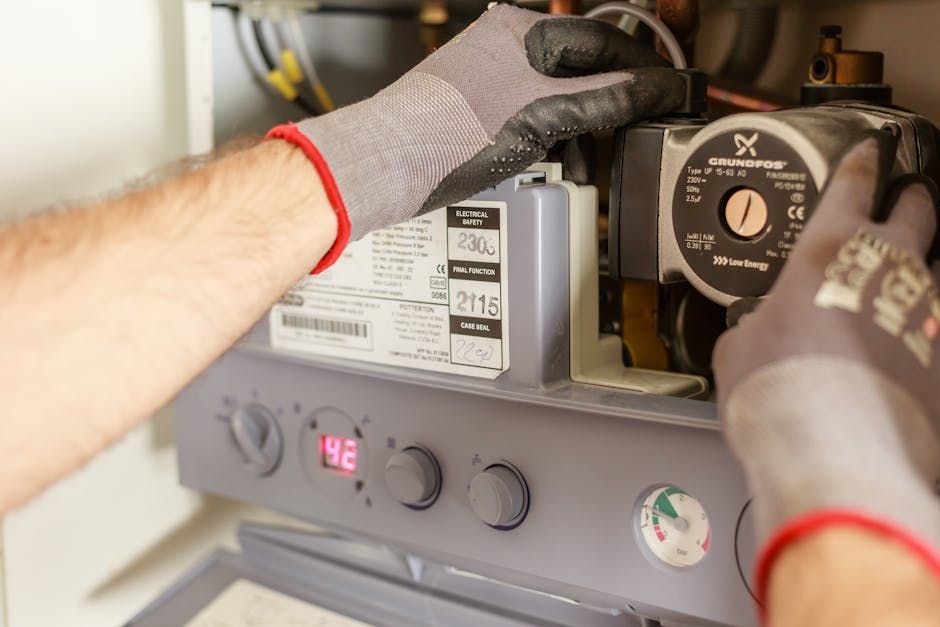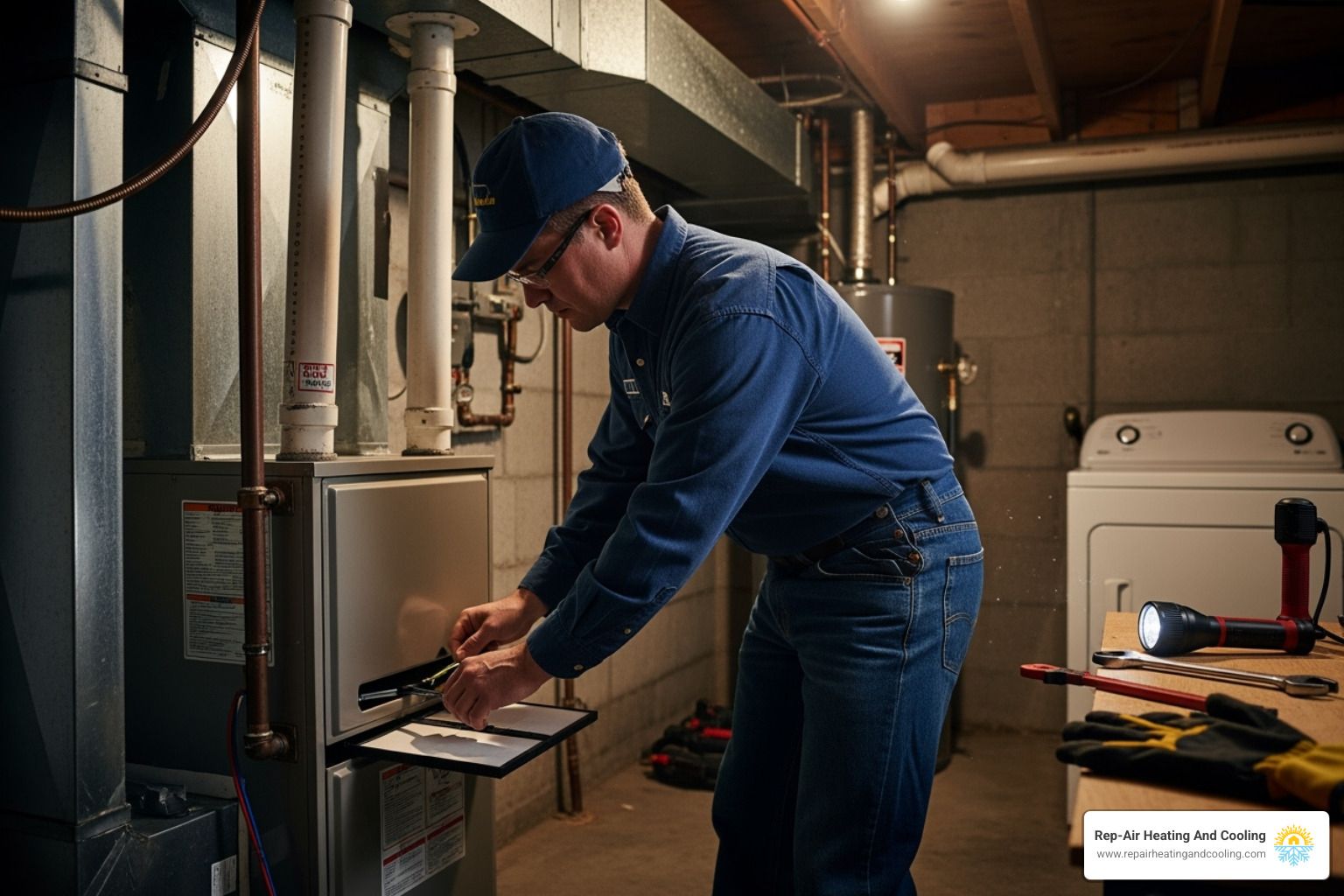Keep Your Cool: The Ultimate AC System Check Guide
IMPORTANT NOTE: . Our company is located in British Columbia, Canada. If you are reading this article in another location, we hope you enjoy the information, but unfortunately we cannot service you.

Table of Contents
ToggleWhy Every Homeowner Needs Regular AC System Checks
An ac system check is essential for keeping your home comfortable and preventing costly breakdowns. Here’s a quick overview:
Key Components to Check:
- Thermostat: Test for accurate temperature control.
- Air filter: Replace every 1-3 months during cooling season.
- Outdoor unit: Clear debris and check for damage.
- Vents: Ensure proper airflow throughout your home.
- Drain line: Check for clogs that can cause water damage.
When to Check:
- DIY checks: Monthly during cooling season.
- Professional inspection: Annually in spring before peak season.
- Emergency checks: When you notice unusual noises, smells, or poor cooling.
Imagine a blistering hot summer day when your AC fails. This frustrating scenario is often preventable with regular system checks that catch problems early, before they become expensive emergency repairs. For example, a dirty air filter alone can reduce your system’s efficiency by up to 30%.
Whether it’s your home or car AC, performing basic checks can save you money and keep you comfortable. This guide will walk you through how to check your AC system safely and effectively.
Is Your AC Crying for Help? Telltale Signs You Need a System Check
Your AC sends out distress signals before it fails. Catching these warning signs early with a proper ac system check can save you from a sweltering Lower Mainland heatwave with a broken system.
- Weak airflow: If you barely feel cool air from a vent, it could be a clogged filter, blocked ducts, or a struggling blower motor.
- Unusual noises: Grinding or squealing often points to failing motor bearings or belts. Banging suggests loose parts, while rapid clicking can mean low refrigerant.
- Unpleasant odors: A musty smell indicates moisture buildup and potential mold. A burning smell could be an electrical issue or overheating motor; turn off your system immediately and call a professional.
- Thermostat issues: If your thermostat is unresponsive or your home never reaches the set temperature, the thermostat itself may be faulty.
- Visible leaks or moisture: Puddles of water around your indoor unit often mean a clogged drain line. Oily residue could indicate a refrigerant leak.
- Rising energy bills: A sudden spike in electricity costs during cooling season means your AC is working harder than it should. Poorly maintained systems can increase your costs by 10-30%.
- Inconsistent temperatures & short cycling: If your home has hot and cold spots or the AC turns on and off in short bursts, your system is running inefficiently, causing extra wear and tear.
If these signs are familiar, it’s time for an ac system check. Learn more in our guide on Signs Your AC is Going to Breakdown.
Understanding Your AC’s Core Components
Knowing your AC’s parts helps you understand what to check. Here’s a quick rundown:
- Compressor: The heart of the system, located in the outdoor unit. It pressurizes and pumps refrigerant.
- Condenser: The large outdoor coil and fan that releases heat from your home.
- Evaporator coil: The indoor coil that absorbs heat from your home’s air.
- Refrigerant: The substance that transfers heat by changing between liquid and gas.
- Blower motor: Moves cooled air through your ducts.
- Thermostat: The control center that tells the system when to turn on and off.
- Air filter: Crucial for efficiency and clean air. A dirty filter is a common cause of AC problems.
- Drain line: Carries moisture away from the indoor unit to prevent water damage.
Understanding these parts highlights the importance of regular maintenance. For more insight, see our article on Why Your AC is Not Cooling Properly.
Your Complete AC System Check Guide
Performing a basic ac system check is manageable for most homeowners, but safety is paramount. Always take these precautions before you begin.
DIY Safety Precautions
- Turn Off Power: For home AC units, switch off power at the thermostat AND the outdoor disconnect switch. For car AC, ensure the engine is off.
- Avoid Moving Parts: Keep hands, clothing, and hair clear of fans and belts.
- Wear Eye Protection: Safety goggles are a must, especially near outdoor units or under a car’s hood.
- Use Gloves: Protect your hands from sharp edges and dirt.
- Never Touch Refrigerant Lines: These lines are pressurized and contain refrigerant that can cause severe frostbite. This is a job for certified professionals only.
Basic Tool List
- Flashlight
- Screwdriver
- Garden hose
- Soft brush or fin comb
- Thermometer
- Gloves and safety glasses
When to Call a Professional for Checks
Some tasks are best left to the pros at Rep-Air Heating And Cooling. Call for help if you encounter:
- Refrigerant Leaks: Hissing sounds or oily residue require specialized tools.
- Electrical Issues: Beyond checking fuses, leave electrical diagnostics to licensed technicians.
- Compressor Problems: Strange noises or a compressor that won’t engage needs professional repair.
- Frozen Coils: Persistent freezing can indicate low refrigerant or other complex issues.
- Anything Beyond Your Comfort Zone: When in doubt, call a professional.
Performing a Basic Home AC System Check
Follow these steps for a monthly ac system check during the cooling season.
- Thermostat Test: Set it to “Cool” and lower the temperature. The outdoor unit should kick on, and cold air should come from the vents within minutes.
- Air Filter Inspection: This is the most important DIY check. A dirty filter restricts airflow and strains your system. Locate the filter, hold it to the light, and if you can’t see through it, replace it. Change filters every 1-3 months. A dirty air filter is one of the most common causes of air conditioning problems.
- Outdoor Unit (Condenser) Cleaning: Turn off the power first. Clear at least two feet of space around the unit, removing leaves, grass, and debris. Gently spray the fins with a garden hose from the inside out. Use a fin comb to straighten any bent fins.
- Condensate Drain Line Inspection: Locate the PVC pipe running from your indoor unit. Check for clogs or standing water in the drain pan. A wet/dry vacuum can clear minor clogs, but call a pro if the problem persists to prevent water damage.
- Inspecting Vents for Airflow: Check that air from supply vents is strong and cold. Ensure return air vents are not blocked. The air from supply vents should be about 15 degrees Fahrenheit cooler than the air entering the return vents. Avoid closing vents in unused rooms, as this can harm your unit. Learn more about Why closing vents can damage your unit.
For a more detailed guide, see How to Inspect Your A/C for Potential Issues: Now is a Great Time.
How to Conduct a Car AC System Check
A quick ac system check can ensure your car’s AC is ready for summer drives.
- Visual Inspection: With the engine off, look for loose wires, damaged hoses, or oily residue (a sign of a refrigerant leak). Ensure the condenser at the front of the engine bay is free of debris.
- Compressor Clutch Check: Start the car and turn the AC to max. The clutch on the front of the AC compressor should click and start spinning. If it doesn’t, or if it cycles on and off rapidly, the system is likely low on refrigerant.
- Drive Belt and Hoses: Inspect the serpentine belt for cracks or wear. Check AC hoses for oily residue around fittings, which indicates a leak.
- Cabin Air Filter: A clogged cabin air filter, often behind the glove box, can restrict airflow and weaken your AC. Check your owner’s manual for its location and replacement instructions.
If these checks don’t solve the issue, consult a professional automotive technician.
Common AC Problems and When to Call a Professional
While DIY maintenance is great, some AC problems require a professional for your safety and to avoid costly mistakes. Knowing when to call for help is key.
Refrigerant leaks: Refrigerant is in a sealed system, so low levels mean there’s a leak. This isn’t a DIY fix, as it requires special tools and handling. Signs include lukewarm air and short cycling.
Electrical issues: Beyond a tripped breaker, electrical problems involving capacitors, relays, or wiring are hazardous and should be left to a licensed technician. For more information, see our guide on Troubleshooting AC Circuit Breaker Issues.
Compressor failure: The compressor is the heart of your AC and its most expensive component. Grinding or knocking sounds mean it’s time to call a pro immediately to avoid a complete replacement.
Fan motor problems: If your indoor or outdoor fan isn’t working, your system can’t cool effectively. Diagnosing motor issues requires professional electrical testing. Learn more from our guide on AC Fan Motor Issues and Fixes.
Frozen evaporator coils: While a dirty filter can cause this, persistent ice usually points to low refrigerant or airflow issues that need a professional ac system check.
Call a professional immediately if:
- Your AC blows warm air.
- You hear grinding, squealing, or banging noises.
- You smell something burning (turn the system off first).
- There’s significant water pooling near the indoor unit.
- The outdoor fan isn’t spinning.
- The circuit breaker keeps tripping.
- The system won’t turn on at all.
- You suspect a refrigerant leak (hissing, oily residue).
Attempting complex repairs yourself can lead to bigger, more expensive problems. For a full list of warning signs, read our resource on AC Needs Professional Repair: Signs.
The Value of Routine Maintenance: Prevention vs. Repair
Let me share something that might sound familiar: You’re enjoying a perfectly cool evening at home when suddenly your AC starts making a strange grinding noise. By morning, it’s completely dead, and you’re facing a scorching hot day with repair bills that make your wallet weep.
This scenario plays out countless times across the Lower Mainland every summer, and it’s almost always preventable. While a timely ac system check is helpful, routine professional maintenance is like having a crystal ball for your cooling system.
Cost savings come from catching small problems before they become major failures. A routine coil cleaning is much cheaper than replacing a burnt-out compressor.
Energy efficiency is where maintenance pays for itself. According to Energy Star, Poorly maintained systems can increase costs by 10-30%. A well-tuned system keeps your utility bills low.
An AC’s extended system lifespan depends on proper care. Maintained systems can last 15-20 years, while neglected ones may fail in half that time.
Improved air quality is another key benefit. Regular maintenance prevents the buildup of dust and allergens, ensuring your family breathes cleaner air.
Finally, there’s peace of mind. Knowing your system has been professionally inspected lets you relax when a heat wave is in the forecast.
| Aspect | Annual Maintenance (Proactive) | Emergency Repair (Reactive) |
|---|---|---|
| Timing | Scheduled, convenient | Unplanned, urgent |
| Cost | Predictable, lower overall | Unpredictable, higher |
| System Efficiency | Optimized, lower energy bills | Reduced, higher energy bills |
| Component Lifespan | Extended | Shortened |
| Comfort | Consistent, reliable | Intermittent or no cooling |
| Stress Level | Low, peace of mind | High, frustrating |
Professional maintenance pays for itself. Learn more about why Preventative AC Service is Essential.
Simple DIY Maintenance Tips to Keep Your AC Healthy
Between professional visits, these simple tasks will keep your AC running smoothly.
- Change filters regularly: Check your filter monthly during cooling season and replace it if it’s dirty. This is the easiest way to improve efficiency.
- Clean the outdoor unit: Keep the area around your condenser clear of leaves and debris. A gentle rinse with a hose keeps the coils clean.
- Keep vents clear: Ensure all supply and return vents are open and unobstructed for proper airflow.
- Check the drain line: Briefly inspect the condensate line for clogs to prevent water damage and mold.
- Monitor performance: Pay attention to new sounds, weaker airflow, or inconsistent temperatures to catch issues early.
- Run your AC periodically: Even in cooler months, run the AC for 10-15 minutes every few weeks to keep parts lubricated.
These small steps add up to big savings. For more seasonal advice, explore our Summer AC Maintenance Tips.
Frequently Asked Questions about AC System Checks
We get a lot of questions about AC maintenance. Here are answers to the most common concerns about ac system check routines.
How often should I have my AC system checked?
Your AC needs both professional tune-ups and your own regular checks.
- Professional Maintenance: Schedule this once a year, ideally in the spring. This allows a technician to catch potential issues before the summer heat arrives, preventing a breakdown on the hottest day of the year.
- DIY Checks: Perform quick monthly checks during the cooling season. Inspecting your air filter and clearing the outdoor unit can prevent common problems.
This two-part approach works for both your home and car AC systems.
What are the risks of attempting DIY AC repairs or recharges?
While basic cleaning is fine, DIY repairs involving refrigerant can be risky and costly.
- Overcharging: Using a DIY recharge kit can easily lead to overcharging the system, which can destroy the compressor—turning a small repair into a major replacement.
- System Contamination: Opening refrigerant lines can introduce air and moisture, causing corrosion and internal damage.
- Masking Leaks: Simply adding refrigerant doesn’t fix the underlying leak. The refrigerant will just escape again, and the system will continue to be strained.
In short, leave any work involving refrigerant or electrical components to the professionals.
How do I know if my AC is working efficiently?
Even if your AC blows cold air, it might not be efficient. Here’s how to tell:
- Airflow & Temperature: Airflow from vents should be strong and consistent. The air coming out should be 15-20 degrees Fahrenheit cooler than the air going into the return vent.
- Cycling Patterns: Your AC should run for a reasonable period and then shut off. If it cycles on and off every few minutes (short cycling) or runs constantly, it’s a sign of inefficiency.
- Quiet Operation: Grinding, squealing, or banging noises indicate a problem.
- Stable Energy Bills: A sudden spike in your cooling costs is a red flag that your system is working too hard.
If your system shows signs of inefficiency, a professional ac system check can identify and fix the root cause.
Stay Ahead of the Heat with a Professional AC Check
We’ve covered everything from spotting warning signs to performing a basic ac system check. The key takeaway is knowing when to handle things yourself and when to call in the professionals.
Regular DIY checks are your first line of defense, catching small issues before they become big, expensive problems. But the real magic happens when your vigilance is combined with professional expertise. While you handle the basics, our technicians can perform the deep technical checks on refrigerant levels and electrical components, ensuring nothing is missed.
This partnership provides invaluable peace of mind, protecting you from surprise breakdowns and emergency repair bills. At Rep-Air Heating And Cooling, we’ve seen how preventative care makes all the difference. We treat every home like our own because we know how important your family’s comfort is.
Your AC system is ready to work hard for you; it just needs the right care. By combining your knowledge with our professional service, you can ensure years of reliable cooling.
Ready to give your AC the professional attention it deserves? Don’t wait for a heat wave. Schedule your professional AC system check in Mission today! Let’s work together to keep you cool all season long.
Request your service today!
Our team of highly trained technicians are standing by ready to help you out with all of your service, repair, and installation needs. You can count on us for on-time repairs, professional installation, and the friendliest customer service in town!Contact Rep-Air Heating & Cooling today to get started with service by requesting a quote online, or by phone at (844) 218-3362.
Request Service
Contact us today to request an estimate or schedule service.

